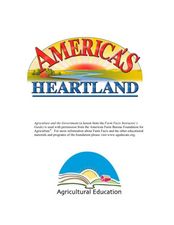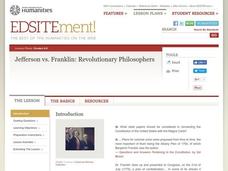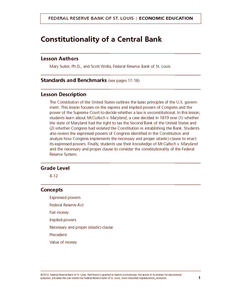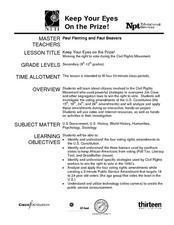Curated OER
The Three Branches of Government
Sixth graders discover details about the 3 branches of government. In this primary source analysis lesson, 6th graders examine documents and images from the Library of Congress to investigate the structure of the U.S. government.
Curated OER
Seals: From the National To the Local
Third graders investigate official government symbols by completing a scavenger hunt. In this U.S. Government lesson, 3rd graders participate in a scavenger hunt in which they locate seals or logos in their community. Students...
Curated OER
Agriculture and the Government
Students study the government's involvement in the U.S. A's food production and make connections relating to farm programs. In this historical agriculture lesson, students read content and research significant information. Students then...
Curated OER
The Impact of the IWW on the Nation or Who were the Wobblies?
Students evaluate the role labor groups had on the U.S. Government in the early 1900's. For this teaching American history lesson, students complete several activities, including response writing and listening to music, that reinforce...
National Endowment for the Humanities
James Madison: Raising an Army—Balancing the States and the Federal Government
To war! To war! Every nation in the history of the world has had to deal with warfare on some level. Scholars go through a series of activities and discussions surrounding the development of the Constitution to help them better...
Curated OER
Jefferson vs. Franklin: Revolutionary Philosophers
Students cite connections among Franklin's Albany Plan of 1754, his Plan of Confederation of 1775 and the U.S. Constitution and/or the Declaration of Independence. In an essay, they give examples of the philosophical and political...
Center for Civic Education
Citizenship Schools and Civic Education During the Civil Rights Movement and in the Present
Your young historians will discover the importance that citizenship education has played in the social progress of the United States as they learn about early efforts to discourage African Americans from voting in the 1960s.
National Endowment for the Humanities
Lesson 4 James Madison: Internal Improvements Balancing Act—Federal/State and Executive/Legislative
Who has the power? The founding fathers asked the same question when the United States was formed. Learners explore issues that arose during Madison’s presidency that raised constitutional questions. Through discovery, discussion, and...
Federal Reserve Bank
Constitutionality of a Central Bank
Considering the expressed and implied powers of Congress, was it constitutional for the United States to establish the Second National Bank in the early nineteenth century? What is the constitutionality of the Federal Reserve System?
Curated OER
Comparing Covenants
Fifth graders investigate what a covenant was and how they relate to contemporary government ideals. In this comparing covenant lesson, 5th graders examine primary source documents that are examples of covenants from 18th century New...
Curated OER
Who Represents You?
Students investigate Congress and how individuals are represented in this Country. In this government lesson, students complete worksheets research government web sites to determine which senators and congressmen represent them....
National Endowment for the Humanities
“Read All About It”: Primary Source Reading in “Chronicling America”
Can investigative journalism become too sensationalistic and accusatory, or is it vital for the survival of a democracy? Middle schoolers analyze primary source documents from early 20th-century newspapers as well as Theodore Roosevelt's...
National Endowment for the Humanities
Lesson 2 James Madison: The Second National Bank—Powers Not Specified in the Constitution
How much power is too much power for the federal government? Scholars use primary documents and constitutional research in groups to analyze the creation of the Second National Bank under James Madison. This is the second lesson of a...
Curated OER
Alexander Hamilton and the Roots of Federalism
Explore the origin of political parties in the United States. Learners work in groups to read and analyze copies of the "Report on Manufactures" written by Alexander Hamilton. Then, they complete a worksheet comparing the Federalists to...
PBS
Lessons in Leadership, Roosevelt Style
It's easy to criticize those in power until you're sitting at their desk, faced with the same decisions. A history lesson prompts secondary learners to research the Roosevelt presidencies through the lens of leadership and...
Curated OER
The United States Flag
Young scholars study the United States flag. In this American history and government lesson, students define and give examples of familiar symbols. Young scholars design a classroom flag. Students identify and describe the American flag.
NPR
Same-Sex Marriage
The battle over same-sex marriage is a prevalent issue in the United States, and a valuable topic to be discussed in your social studies classroom. Here is a basic outline of introductory questions, focus questions, vocabulary, and media...
Curated OER
Keep Your Eye On the Prize
High schoolers learn about citizens who were actively involved in the civil rights movement, and the strategies they used to overcome the Jim Crow laws that were so prevalent in the 1960s. They investigate the voting amendments of the US...
Curated OER
A Lesson To Accompany "The First Bank of the United States: A Chapter in the History of Central Banking"
Here is an interesting topic. Learners examine the economics that led to the founding of the First Bank of America. They participate in a reader's theater experience depicting the debate between Alexander Hamilton and Thomas Jefferson...
Tennessee State Museum
An Emancipation Proclamation Map Lesson
Did the Emancipation Proclamation free all slaves during the Civil War? Why was it written, and what were its immediate and long-term effects? After reading primary source materials, constructing political maps representing information...
Curated OER
Woodrow The White House Mouse
Inauguration Day is January 20. Implement an entire week's worth of mini activities to help young historians become knowledgeable of the President's job, the executive branch, and the White House. The worksheets focus on research skills,...
Curated OER
The Rise of the City States in Greece
Sixth graders examine Ancient Greece and its development of democracy. In this Greek History lesson, 6th graders explore the rise of city-states in Greece and its overall effect on the development of democracy. The class continues with...
Constitutional Rights Foundation
History of Immigration From the 1850s to the Present
The Statue of Liberty may embrace the huddled masses of the world, but has American society always joined in? After young historians read a passage about the history of American immigration in the 19th and 20th centuries, focusing on...
Curated OER
Bill of Rights
US history classes explore constitutional rights as they relate to court cases involving teens. Your class must already be familiar with the Bill of Rights before beginning this series of exercises. In preparation for a debate-style...

























